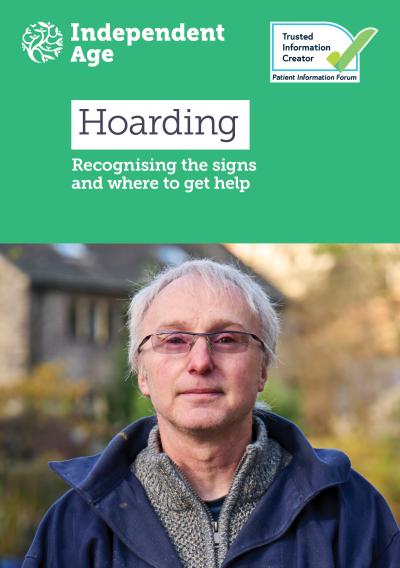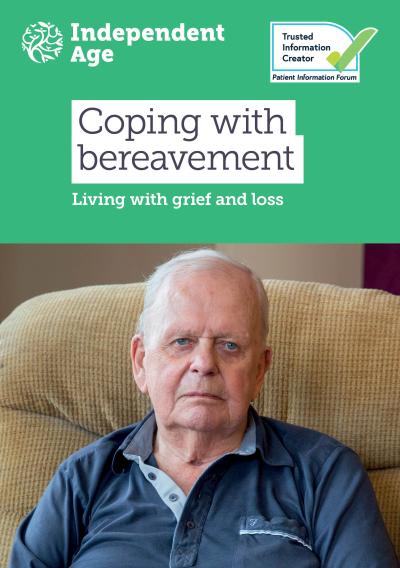Related publications

Hoarding
Home safety

Many of us like to keep things that have special meaning for us. For some of us, though, the number of possessions we have and our attachment to them can seriously affect our lives. Hoarding disorder is complex but, if you need help, there is support available.
Hoarding is when you collect a lot of things that you have difficulty letting go of and they cause unmanageable clutter.
Many of us like to keep special things and we all have different standards of what we think is messy or cluttered. What makes hoarding different is the attachment you have to the objects you keep and the impact that it has on your daily life. For example, you may not be able to get into or use your kitchen or bathroom. This can then affect other aspects of your life, such as being able to cook for yourself and eat healthy food, or your hygiene.
There are many different things you might hoard. They may include:
Digital hoarding of data such as emails, photos and files, is also becoming more common. This can become as difficult to manage as physical objects. Or you may buy extra storage and other devices, which can add to the clutter.
Hoarding can be a mental health condition in its own right – a hoarding disorder – or it might be a symptom of another condition, such as depression, obsessive compulsive disorder (OCD), dementia or a brain injury. Hoarding may also be part of an alcohol or drug addiction, which can have complex causes.
The causes of hoarding are not fully known. Sometimes people start hoarding after a stressful change in personal circumstances, such as retirement, bereavement or illness. It may be connected to a trauma you’ve experienced, sometimes from childhood. Most people who hoard live alone. There may be very personal reasons why you hoard that you’re not comfortable sharing.
Many people who hoard wouldn’t describe themselves as hoarders. If you’re concerned, ask yourself the following questions:
If you’re affected by some of these things and they cause you distress, you can speak to your GP about getting help.
Hoarding can affect your emotions in different ways.
Hoarding can affect your relationships and lead to conflicts. For some people, it can also lead to money worries or make them vulnerable to bullying by local people.
Some of the problems that you may experience in later life can become worse if your home is cluttered.
Clutter can also be a fire hazard and make it difficult to leave your home in an emergency. Even if you feel you can’t address all your clutter, you could consider making parts of your home safer. Your local fire service can advise on fire safety and preventing falls.
Hoarding might make you feel ashamed and you may try to keep it hidden. If hoarding is making you feel distressed or unwell, there is help available. Remember that it’s not your fault and you shouldn’t be judged.
The first step is to talk to your GP. If you find it difficult to raise the subject, you could use pictures to show the scale of the problem, such as a clutter image rating tool. You could also use an icebreaker form to help you explain your situation.
Your GP might refer you to local mental health services, or a psychiatrist or therapist who specialises in hoarding. If your hoarding is a symptom of another condition, you’ll probably be offered treatment for that first. You may need treatment for the underlying reasons for your hoarding, such as trauma or loss, before you can deal with your possessions.
In England, you can refer yourself to NHS Psychological Therapies (IAPT) services if you prefer.
You could also contact your local council if you need care or support, but your hoarding is making that difficult.
For general advice on looking after yourself and help with other problems, such as bereavement or debt, see looking after your mental health.
The main treatment for hoarding is psychological therapy. You might also be offered medication. There is no medication specifically for hoarding disorder, but sometimes medication can help if you experience another condition as well, such as depression or anxiety.
The main psychological therapy is cognitive behavioural therapy (CBT), which can help you to change the thoughts and feelings that lead you to hoard. It can take a long time, but CBT can be very effective. CBT may involve someone coming to your home to work with you on your possessions. Other types of talking therapies, such as counselling, may also be helpful.
You could seek help privately, but this can be expensive. Ask your GP to recommend a therapist or contact the British Association for Counselling and Psychotherapy to find an accredited therapist. For services in Scotland, contact COSCA.
Everyone has the right to respect for their private life and home, and to peaceful enjoyment of their possessions. However, hoarding can bring you into conflict with neighbours and might attract the attention of outside agencies, such as the council’s environmental health department or your landlord.
The environmental health team might become involved if your home is posing a risk to your health or other people’s. They should speak to you first about what they think needs to be done to your home, such as pest control or repairs.
If you rent, your landlord has the right to inspect the condition of your home at a reasonable time. They must give you at least 24 hours’ written notice before they do this. Your landlord also has the right to enter your home to carry out necessary repairs if they give reasonable notice. If you don’t let them in, they may take legal action or try to evict you.
If you’re unable to look after an animal properly because of your hoarding, animal welfare agencies may get involved.
For information about your rights under mental health law, contact Mind's Legal line. If you’ve been threatened with eviction and you need advice urgently, contact Shelter or Citizens Advice.
If you find it difficult to express your views and wishes, you may benefit from the support of an independent advocate.
It can help to talk to someone you trust who won’t judge you. If there’s no one you feel you can open up to, you could try contacting a helpline such as Samaritans or The Silver Line, a free, confidential helpline for older people.
Sharing your problems with people who have similar experiences can be helpful.
A support group or forum may be able to offer practical advice and encourage you to make changes if you’ve reached a point where you feel ready to do this. Contact Mind for details of local support groups or join their online community Side by Side. In Scotland, contact SAMH.
Some organisations are specifically for hoarding support, including:
Hoarding sometimes overlaps with OCD. Contact OCD Action for help and advice if you’re affected by both.
Once you’ve addressed the issues that have led to your hoarding, you may feel ready to start making changes within your home.
Hoarding UK has a useful booklet Overcoming Hoarding: The Basics which has more tips.
You could consider using a decluttering service, but you’ll usually have to pay for this. You can find one through hoarding charities or your local council. Make sure they understand hoarding and will work with you to decide what to discard.

For more information about hoarding, where you can get help, and how to help someone you’re worried about, read our free advice guide.
By calling Independent Age's free and impartial Helpline, you can get information and advice from one of our friendly advisers, or order our free guides.